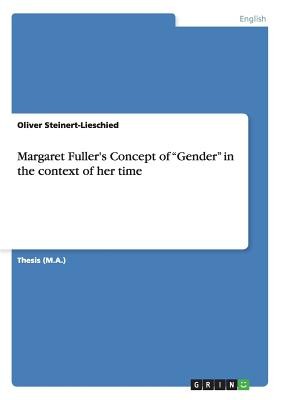
- We will send in 10–14 business days.
- Author: Oliver Steinert-Lieschied
- Publisher: GRIN Verlag
- Year: 2010
- Pages: 116
- ISBN-10: 3640534115
- ISBN-13: 9783640534111
- Format: 14.8 x 21 x 0.7 cm, softcover
- Language: English
- SAVE -10% with code: EXTRA
Margaret Fuller's Concept of Gender in the context of her time (e-book) (used book) | bookbook.eu
Reviews
Description
Thesis (M.A.) from the year 2007 in the subject American Studies - Literature, grade: 2,00, University of Göttingen, language: English, abstract: "Let them be sea-captains, if you will", Margaret Fuller stated in her main work Woman in the Nineteenth Century (Woman 346). Although even nowadays there may be only few female sea-captains, the quoted statement would hardly provoke anyone, at least not someone in our contemporary western culture. However, when regarded in its historical context, two questions arise: Firstly, what underlying gender concept encouraged Fuller to make such a statement, in "a time of excessive gender polarization" (Bomarito (vol2) 1), a time in which the ideal of domesticity and Republican Motherhood (Freedman 25) determined the role of woman? And secondly, how did antebellum American society react to such statements? The first question will be the main issue of part III, the main part of my work. I will begin with Fuller's general gender concept that involves ideas of androgynity and the "degendering" (Davis 182) of language. Next, the major influences on her concept, namely those of transcendentalism (with special consideration of Emerson), Goethe, Fourier and Swedenborg will be dealt with. Lastly, I will consider how Fuller applied her concept to the specific fields outlined in chapter II, that is, marriage, education and economy. I will concentrate on her main work Woman in the Nineteenth Century because Fuller describes her gender concept there in most detail, whereas her other works such as Summer on the Lakes do not contribute much additional information that is of special significance for the understanding of her gender concept. This is especially true in the case of her Memoirs, which was heavily edited and censored by Emerson and others. It rather distorted Fuller's reputation, as Urbanski states (5). Therefore I will only occasionally refer to them, whenever they provide further information that is relevant to my topic. Regarding t
- Author: Oliver Steinert-Lieschied
- Publisher: GRIN Verlag
- Year: 2010
- Pages: 116
- ISBN-10: 3640534115
- ISBN-13: 9783640534111
- Format: 14.8 x 21 x 0.7 cm, softcover
- Language: English English
Thesis (M.A.) from the year 2007 in the subject American Studies - Literature, grade: 2,00, University of Göttingen, language: English, abstract: "Let them be sea-captains, if you will", Margaret Fuller stated in her main work Woman in the Nineteenth Century (Woman 346). Although even nowadays there may be only few female sea-captains, the quoted statement would hardly provoke anyone, at least not someone in our contemporary western culture. However, when regarded in its historical context, two questions arise: Firstly, what underlying gender concept encouraged Fuller to make such a statement, in "a time of excessive gender polarization" (Bomarito (vol2) 1), a time in which the ideal of domesticity and Republican Motherhood (Freedman 25) determined the role of woman? And secondly, how did antebellum American society react to such statements? The first question will be the main issue of part III, the main part of my work. I will begin with Fuller's general gender concept that involves ideas of androgynity and the "degendering" (Davis 182) of language. Next, the major influences on her concept, namely those of transcendentalism (with special consideration of Emerson), Goethe, Fourier and Swedenborg will be dealt with. Lastly, I will consider how Fuller applied her concept to the specific fields outlined in chapter II, that is, marriage, education and economy. I will concentrate on her main work Woman in the Nineteenth Century because Fuller describes her gender concept there in most detail, whereas her other works such as Summer on the Lakes do not contribute much additional information that is of special significance for the understanding of her gender concept. This is especially true in the case of her Memoirs, which was heavily edited and censored by Emerson and others. It rather distorted Fuller's reputation, as Urbanski states (5). Therefore I will only occasionally refer to them, whenever they provide further information that is relevant to my topic. Regarding t


Reviews